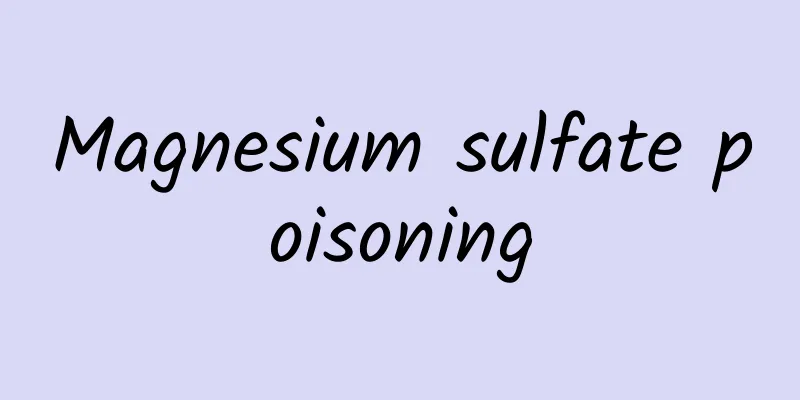Magnesium sulfate poisoning

|
Magnesium sulfate is a commonly used drug. In order to detect more clearly during colonoscopy, magnesium sulfate powder is generally used as a catharsis. Magnesium sulfate has a strong catharsis function. Therefore, the dosage must be controlled. The same amount of magnesium sulfate powder cannot be used for catharsis regardless of weight. Such inaccurate dosage can easily lead to magnesium sulfate poisoning in patients and cause various physical discomforts. After magnesium sulfate poisoning, bradycardia will occur, vital signs are relatively weak, and some people may also experience nausea and vomiting. Severe magnesium sulfate poisoning may even cause coma. Therefore, when using injections or powder containing magnesium sulfate, you must detect these uncomfortable symptoms in time. The following describes how to solve magnesium sulfate poisoning. 1. Immediately stop taking magnesium sulfate. If poisoned by accident, immediately perform gastric lavage and take milk or egg white orally to protect the gastrointestinal mucosa. 2. Patients who are dehydrated due to excessive laxatives can take sugar and saline solution orally. Generally, 20g of glucose or 40g of sucrose is added to 1000ml of saline solution to help the small intestinal mucosal epithelial cells absorb Na+ and Cl-. In emergency cases, intravenous rehydration should be given. Pay attention to replenishing potassium salt. 3. Management of hypermagnesemia (1) Immediately inject 10% calcium gluconate or 10% calcium chloride 10-20 ml intravenously. C2+ and Mg2+ have similar chemical properties and can compete for the same binding site on cells. Increasing the concentration of Ca2+ in the blood can repel the binding of Mg2+ to the binding site. Moreover, Ca2+ can induce the release of acetylcholine from motor nerve endings, antagonizing the effect of Mg2+. The symptoms of hypermagnesemia will be relieved about 30 seconds after calcium injection, but it will be short-lived. If there is no effect within 2 minutes after injection, the injection can be repeated. (2) Patients without obvious dehydration and with normal renal function may be given diuretics to promote urinary magnesium excretion. (3) All patients with severe hypermagnesemia, especially those with chronic renal failure, require peritoneal dialysis or hemodialysis. (4) The main causes of death from acute magnesium poisoning are respiratory failure and cardiac arrest, so artificial respiration equipment should be prepared in time and heart disease should be actively treated. The above introduces some methods of magnesium sulfate poisoning, I hope it will be helpful to you. Generally, you should not decide the dosage of magnesium sulfate powder on your own. You should follow the doctor's instructions. As a doctor, you must pay attention to the serious hazards of excessive magnesium sulfate. Don't be too careless. Tell the patient the dosage according to the standard, which can achieve the laxative function without causing physical harm to the patient. I hope that patients with magnesium sulfate poisoning can recover their health through proper treatment. |
<<: Best treatment for periostitis
Recommend
Chinese patent medicine for regulating spleen and stomach and nourishing liver and kidney
Nowadays, people are very aware of health, so the...
What causes peeling hands?
What is the reason for peeling hands? Many people...
What is the function of moxibustion beauty stick?
Acupuncture is a method of achieving therapeutic ...
What are the causes of neurasthenia and body aging?
Neurasthenia is a long process that can cause man...
Seven things to keep in mind when doing acupuncture
Acupuncture is a magical part of traditional Chin...
What should I do if I have hemorrhoid pain? How should I treat hemorrhoid pain?
Hemorrhoid pain is a symptom common to all hemorr...
Who should eat Tiepi Fengdou?
As a precious Chinese medicine, the Iron Bark Map...
What are the effects of donating a kidney on the body?
The kidneys are the body's detoxification org...
How to reduce obesity caused by spleen deficiency, strengthen the spleen and lose weight without rebound
In life, some obese people often joke about thems...
How to treat chronic enteritis in babies
Enteritis has become a very common disease nowada...
Massage methods for sciatica
Patients with sciatica can achieve good relief if...
There is a pain in the left shoulder blade
Pain in the left shoulder blade is quite common i...
What does the smallpox vaccine prevent?
The cowpox vaccine prevents smallpox, which is an...
Viral cold
Cold is a common disease that almost everyone has...
How to treat corn-like warts
Many people do not know how to treat warts simila...









